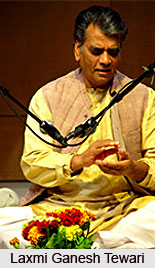 Laxmi Ganesh Tewari has been reckoned as one of the leading Indian Classical Hindustani vocalist. This proponent of Gwalior gharana (tradition) of vocal music, followed up on his education as well as teaching in the United States of America after completing his studies at Banaras Hindu University in Varanasi under Dr. Lalmani Misra. Since the year 1974, Pandit Laxmi Ganesh Tewari has been attached with the Sonoma State University and carrying forward his performance, scholarship and teaching there. Pandit Laxmi Ganesh Tewari believes that the music is not something one can do today, expecting to get the "fruit" a few years down the line. One must constantly work at it to get the fruit to taste sweet, to make the sound beautiful. Nor is it an art one can put aside for awhile. But if a person has the dedication, it will slowly and surely become a medium of meditation.
Laxmi Ganesh Tewari has been reckoned as one of the leading Indian Classical Hindustani vocalist. This proponent of Gwalior gharana (tradition) of vocal music, followed up on his education as well as teaching in the United States of America after completing his studies at Banaras Hindu University in Varanasi under Dr. Lalmani Misra. Since the year 1974, Pandit Laxmi Ganesh Tewari has been attached with the Sonoma State University and carrying forward his performance, scholarship and teaching there. Pandit Laxmi Ganesh Tewari believes that the music is not something one can do today, expecting to get the "fruit" a few years down the line. One must constantly work at it to get the fruit to taste sweet, to make the sound beautiful. Nor is it an art one can put aside for awhile. But if a person has the dedication, it will slowly and surely become a medium of meditation.
Early Life of Laxmi Ganesh Tewari
Pandit Laxmi Ganesh Tewari was born on 8th September in the year 1938 at Kanpur, Uttar Pradesh, India. At the Banaras Hindu University he has also studied under Professor B. R. Deodhar. Eventually he earned his doctorate degree in music from there in the year 1967. He further studied at the Wesleyan University US and also obtained his PhD in the year 1974. His PhD subject was ethnomusicology. Today Pandit Laxmi Ganesh Tewari has been regarded as one of the front most ethnomusicologists who has made his body of work. He has made a combination of Indian, Buddhist, Arabian and Gamelan music to form the `body of work`.
Career of Laxmi Ganesh Tewari
Like many other Indian Clasical vocalist, Pandit Laxmi Ganesh Tewari has also recorded many of his execution. `Sameshwari`, a Raga created by Dr. Lalmani Misra in order to uphold the notes of Samagana of Sama Veda period is one of the noteworthy recordings done by Pandit Laxmi Ganesh Tewari. To enrich his body of work, he has done many field researches in the countries like India, Turkey, Trinidad and Tobago, Thailand, Fiji, Ghana, and Zimbabwe. From his field researches, he has made some documentary. They are: Turkish Village Music, New York: Nonesuch Records, in the year 1972; Folk Music of India: Uttar Pradesh, Berlin: International Institute for Comparative Music Studies, in the year 1991; Vichitra Vina Music from South Asia, Anthology of Traditional Music; Paris: Auavidis/UNESCO, in the year 1996; Trinidad: Music from the North Indian Tradition. Anthology of Traditional Music; Paris: Auavidis/UNESCO, in the year 1999; Celestial Music of Pandit Lalmani Misra, Santa Rosa, California: Svar Sadhana, in the year 2007.
Musical Records of Laxmi Ganesh Tewari
Pandit Laxmi Ganesh Tewari has written many articles of his own, which fetched position in the journals like, South Asia Research, South Asia Journal, and Asian Folklore Studies. Some noted books written by him are: A Splendour of Worship: Women`s Fasts, Rituals, Stories, and Art. New Delhi: Manohar in the year 1991; Alhakhand ki Parampara. Lucknow: Uttar Pradesh Sangeet Natak Akademy, in the year 1993; Folk Songs of Trinidad Indians, Port of Spain, Trinidad: SWAHA publications, in the year 1994; Singitendu Pandit Lalmaniji Misra: Ek Pratibhavan Sangitagya. Santa Rosa, California: Svar Sadhana, in the year 1996; Svar Sadhana, Santa Rosa, California: Svar Sadhana, in the year 1998; Folk Songs from Uttar Pradesh, India. New Delhi: D.K. Printworld in the year 2006.
Some personal recordings done by him are Laxmi G. Tewari: Master Indian Classical Vocalist, San Rafael, California: Alam-Madina, in the year 1983; Background vocal music for Sacred Verses, Healing Sounds, by Deepak Chopra (two audio cassettes), San Rafael, California: New World Library, in the year 1994; Morning Glory: Indian Classical Vocal Music, Santa Rosa, California: Svar Sadhana, in the year 1995; Bhajan: A Rainbow of Devotional Songs, Santa Rosa, California: Svar Sadhana, in the year 1998 and Svaranjali, Santa Rosa, California: Svar Sadhana, in the year 2002.
When he was asked about the future of Indian music he conveyed that he sees it flourishing around the world in two different ways: both as a pure form, and as fusion music. The practical American mind feels it must be able to earn money at what it has studied so hard to accomplish. Thus there is a tendency to mix Indian music with Western music and he never hesitates that.




















